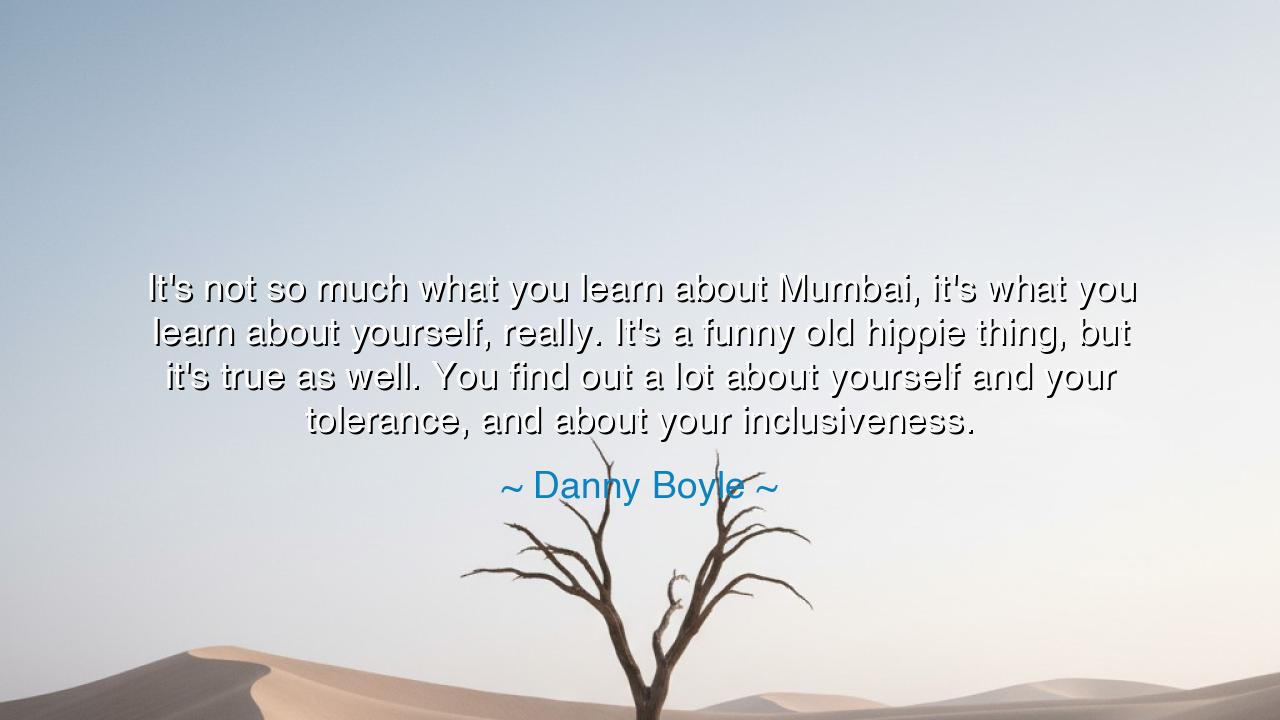
It's not so much what you learn about Mumbai, it's what you learn
It's not so much what you learn about Mumbai, it's what you learn about yourself, really. It's a funny old hippie thing, but it's true as well. You find out a lot about yourself and your tolerance, and about your inclusiveness.






In the words of Danny Boyle, “It’s not so much what you learn about Mumbai, it’s what you learn about yourself, really. It’s a funny old hippie thing, but it’s true as well. You find out a lot about yourself and your tolerance, and about your inclusiveness.” — there echoes a truth as ancient as the wanderer’s road itself: that travel does not merely reveal the world to us, but reveals us to ourselves. Beneath the humility of his tone lies a timeless revelation — that the true destination of every journey is not a city or a landscape, but the soul of the traveler. When Boyle speaks of Mumbai, he speaks not only of a place of dazzling contradictions, but of a mirror held up to the human heart — a place that tests, challenges, and awakens those who are willing to see.
The meaning of this quote is both spiritual and practical. To walk through a city like Mumbai, with its whirl of light and shadow, its noise and its grace, is to confront the entire spectrum of existence. Wealth and poverty, chaos and compassion, beauty and despair — all coexist in its streets. It is easy to pass judgment from afar, to label, to categorize. But when one steps into that living symphony, when one walks among its people, breathes its air, and feels its pulse, the walls within begin to crumble. What Boyle describes as “a funny old hippie thing” is, in truth, a deep and universal insight: to understand others, one must first confront oneself. Mumbai — or any great city — becomes not just a place, but a teacher.
The ancients spoke often of this kind of revelation. Siddhartha Gautama, before becoming the Buddha, left his palace and walked among the people of India. He saw sickness, age, and death for the first time, and in that encounter, the veil of comfort was lifted. What he learned was not merely about the suffering of others, but about the limits of his own understanding. So too, when Boyle speaks of “tolerance” and “inclusiveness,” he points to this same inner awakening. It is not the city that must change — it is the traveler’s heart that must expand. To walk in a place that overwhelms you is to learn humility; to see the dignity of others amid hardship is to rediscover your own humanity.
In the making of Slumdog Millionaire, Boyle immersed himself in Mumbai’s contrasts — its rawness, its energy, its fierce joy amid struggle. What struck him was not the foreignness of the place, but its reflection of the universal. He learned, as all true artists must, that life cannot be neatly divided into rich and poor, East and West, joy and pain. The same light shines on all — and it is only our perception that divides it. In saying, “It’s not so much what you learn about Mumbai,” Boyle acknowledges that the deeper lesson was not in observation, but in transformation — that the city, with all its complexity, had turned his gaze inward.
Throughout history, travelers have spoken of such awakenings. The Greek philosopher Herodotus once wrote that he left home “to see the marvels of the world,” but returned “with the marvel of the world within.” The desert pilgrims of the Middle East, the wandering monks of China, the explorers of distant seas — all returned home changed not because of what they saw, but because of what they became. The journey, in truth, is never outward. It is the movement of the heart from narrowness to breadth, from judgment to understanding, from fear to inclusiveness.
The lesson we are to take from Boyle’s reflection is clear: that true growth lies in the meeting of difference. Seek out what challenges you. Step beyond the walls of your comfort, for only in discomfort do you meet your true self. When you encounter cultures, people, and experiences that unsettle you, resist the urge to retreat. Instead, ask: What part of myself is being revealed here? For every moment of irritation is a mirror; every face of difference is an opportunity to practice empathy. The wise know that tolerance is not a posture of superiority — it is the quiet recognition that all souls share the same breath of life.
Therefore, my friends, remember the wisdom hidden in Danny Boyle’s humble words. Do not seek the world merely to collect its images or stories. Seek it to dissolve the boundaries within yourself. When you travel — whether across oceans or across the street — carry openness instead of expectation. Let the world teach you to see without dividing, to love without measure. For in the end, every city, every encounter, every stranger is a reflection of your own becoming.
And when you find yourself, as Boyle did, standing before the laughter of Mumbai, or the dust of its streets, may you also hear the laughter of recognition — that the world outside and the world within are not separate, but one. That is the true journey of the human spirit: not to escape the self, but to expand it, until it embraces all things in compassion, humility, and light.






AAdministratorAdministrator
Welcome, honored guests. Please leave a comment, we will respond soon